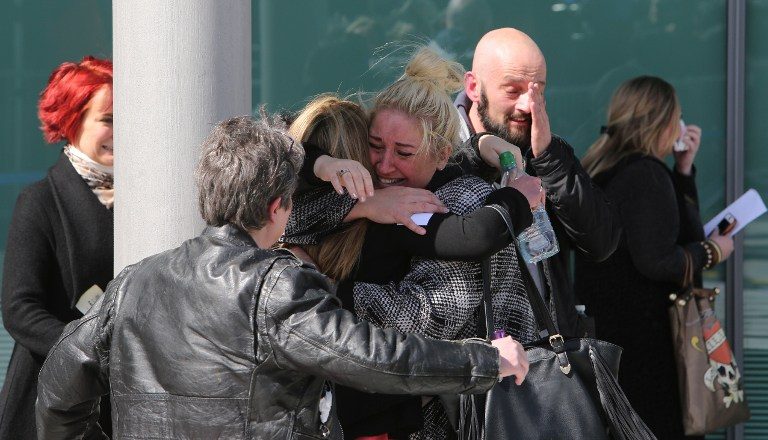SUMMARY
This is AI generated summarization, which may have errors. For context, always refer to the full article.

WARRINGTON, United Kingdom – The 96 Liverpool fans who died in the Hillsborough football stadium disaster were unlawfully killed, a jury has concluded, finding Britain’s worst sporting tragedy was partly down to police errors.
The result, which concluded a near 3-decade campaign by relatives of the victims of the 1989 match, was splashed across the front pages of Wednesday’s (April 27) newspapers. “After 27 years, justice” read The Guardian.
After hearing evidence for two years, jurors concluded on Tuesday, April 26, that policing decisions at the ill-fated game “caused or contributed” to the deaths, and amounted to “gross negligence”.
Relatives had been incensed by a 1991 inquest ruling the deaths were accidental, and there were shouts of “Yes!” in court when the jury’s verdicts were delivered, with people jumping to their feet.
Many emerged from the courtroom hugging and in tears.
They linked hands and sang the Liverpool Football Club anthem “You’ll Never Walk Alone” and chanted “Justice for the 96!”.
“We have had two years of hell going up and down to the court each day, but the only thing I can say at the end of it today: it has been well worth it,” said Margaret Aspinall, whose 18-year-old son James died at the stadium in Sheffield, northern England.
Thousands are expected to attend a commemoration in the northwestern city of Liverpool on Wednesday featuring music and speeches in the company of victims’ relatives.
No one has ever been successfully prosecuted over the disaster and under English law, an inquest exists solely to determine how deaths came about.
But the Crown Prosecution Service (CPS), England’s state prosecutors, said it would consider whether to bring charges once ongoing investigations conclude, probably by the end of the year.
Policing ‘catastrophically wrong’
The disaster occurred on April 15, 1989 during an FA Cup semi-final between Liverpool and Nottingham Forest.
Seeking to alleviate a crush that had developed outside the ground shortly before kick-off, David Duckenfield, the senior officer in charge of policing the event, ordered the opening of an exit gate.
That enabled 2,000 fans to surge into the already over-full terracing pens behind one of the goals, causing a fatal crush. Some 38 of the victims were aged 10 to 19.
Duckenfield, now 71 and retired, admitted at the inquest that he told a “terrible lie” in the immediate aftermath of the match by claiming that fans had stormed the gate.
The inquest, which began in March 2014, took place in Warrington, northwest England, 15 miles (25 kilometers) outside Liverpool.
One juror was discharged as she suffered a nervous breakdown after sitting through all the evidence in Britain’s longest-ever inquest.
John Goldring, a retired judge who presided over the hearings, asked the nine-member jury to decide on 14 key points, with the issue of whether the victims were unlawfully killed the central question.
South Yorkshire Police chief David Crompton said the force “unequivocally” accepted the verdicts, saying they got the match policing “catastrophically wrong”.
The then-editor of The Sun tabloid Kelvin MacKenzie, who approved a front-page story that blamed fans for the crush, said he was “profoundly sorry”.
The report, which falsely claimed that fans stole from victims’ bodies and urinated on policemen, had prompted a mass boycott of the newspaper in the Liverpool area.
Tributes in Liverpool
Jurors also concluded that the behavior of Liverpool supporters did not cause or contribute to the crush outside the ground.
The inquest had highlighted how police officers’ accounts of what happened had been changed in what lawyers for the victims’ families said was a deliberate attempt to suppress evidence.
It also heard evidence from an officer who had been in South Yorkshire Police that the force had decided to blame drunken, ticketless Liverpool fans for the disaster.
The tragedy occurred when English football hooliganism was at its height, 4 years after the Heysel stadium disaster in Brussels killed 39 people before the European Cup final between Liverpool and Juventus.
The response to Hillsborough dramatically changed the experience of attending top-flight football matches in England.
All-seater stadiums were made mandatory in the 1990s following a report into what happened while alcohol bans and the segregation of rival fans also helped open up the game to new supporters.
Home Secretary Theresa May will set out the government’s full response to the inquest’s findings in parliament on Wednesday. – Paul Ellis with Robin Millard in London, AFP / Rappler.com
Add a comment
How does this make you feel?
There are no comments yet. Add your comment to start the conversation.